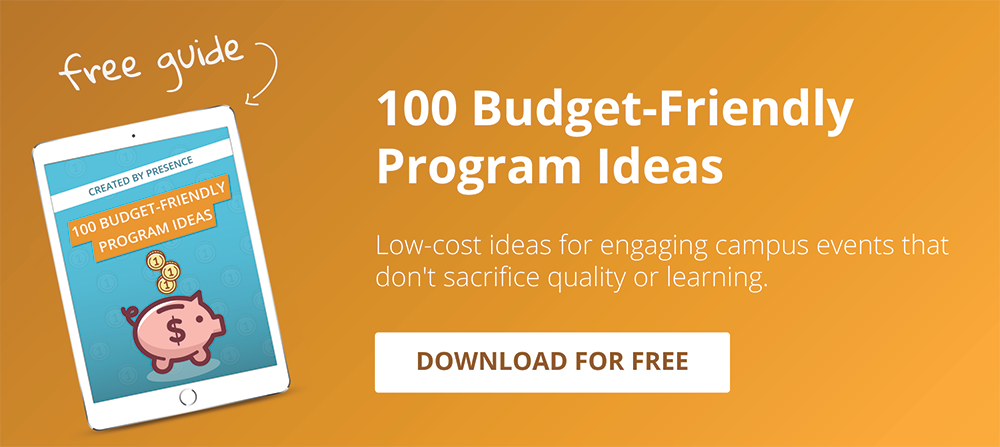Improving an organization is a never-ending process.
That’s why I’ve gathered nine more organizational success topics that you could present to student leaders. With this repertoire of topics, you can build a comprehensive workshop series to suit the needs of your student leaders.
You can find the first nine topics that I wrote about here.
1. DEI & Community Building
Diversity, equity and inclusion go hand-in-hand with community building.
As I outlined in a previous post, organizations seeking to build community need to incorporate DEI into their recruitment and retention strategies.
For example, in order to recruit a diverse membership, students need to understand how implicit bias affects whom they choose to interact with during recruitment activities and how their organization can take part in diversity awareness initiatives.
During the workshop, review some ways for students to make their organizations more inclusive. Some examples include making sure that guest speakers represent the range of identities that students hold and asking officers to share their pronouns when introducing themselves.
This post also offers some key tips around navigating DEI conversations with student leaders. This graphic by D-L Stewart could also be useful in explaining DEI concepts to students.
To help students lean into the idea that they can design the community experiences that they want members to have, I highly recommend reading up on how to create a culture deck, particularly “The Member Experience” section.
2. Alumni Engagement
Org alumni are forgotten and untapped as a resource. That’s a shame as alumni can greatly enrich a student organization’s programming and contribute to fundraising efforts.
A workshop about alumni engagement can teach students how to maintain connections to their alumni and leverage those connections to increase alumni engagement for the benefit of their current members.
Here are some examples of such engagement for different types of student orgs:
- Academic-focused orgs: Alumni may be interested in hosting industry-specific skill-building workshops and attending networking events with students.
- Affinity-based orgs: Alumni who share an identity with current members (such as the Black Student Association, the LGBQTIA+ Pride Club, or Hillel), may want to stay connected through mentoring programs and community celebrations.
- Hobby-based orgs: Alumni of the campus newspaper or radio station might enjoy reconnecting during a reception hosted by the org or being invited to serve as judges in an annual Battle of the Bands or writing contest.
Some student organization leadership structures include an alumni liaison position. This workshop could encourage students to explore whether they should create such a position. This appointed or elected student leader would streamline communication with alumni by serving as a single point of contact, as well as designating someone to work on related projects, such as an alumni newsletter.
3. Budgeting
A budgeting workshop can help leaders of newer orgs plan to make the most of their limited budgets. And leaders of more established organizations can learn how to divvy up a complex budget through multiple committees or budget lines.
A key learning outcome of a budgeting workshop should be that students will be able to match their budgeting process to their goals, regardless of the size of their budget. You might provide a sample budget and demonstrate how an org could allocate certain percentages of that budget to hosting programs and purchasing meeting supplies.
Have students consider: if they were to reach the maximum budget allotted for a particular line item but still need to make more purchases, would they take funds from another line item or would they honor the maximum budget level that they had set? The answer to this question can be clarified by understanding which line item is a bigger priority.
In this workshop, you should also discuss other possible sources of funding beyond what’s allotted to them by the student government. For example, there may be applications available for capital purchases, travel funds, or late-night programming.
These blog posts about programming on a shoestring budget, 100 budget-friendly programs, and student orgs staying on budget have additional examples that you can incorporate into a budgeting workshop.

4. Fundraising
Whether they’re raising money for a charity or for their own organization, students will find that there are a lot of moving pieces involved in pulling off a successful fundraiser.
First, students need to articulate what exactly they are raising money for. It might be funding for a conference trip, philanthropy for a cause, or even an expensive piece of equipment. No matter the case, impress upon students the importance of incorporating the fundraiser’s “why” into their marketing efforts.
Help students understand how to set an appropriate fundraising goal. The fundraising experts at Fundable suggest taking these factors into consideration:
- The size of your network (How many people might contribute to my fundraiser?)
- How much energy you can commit to marketing (Can we devote enough time to make this fundraiser a success?)
- How much people might be willing to pay for the product or service you’re selling (How much of the product, service, or experience will we have to sell to meet our goal? Is that feasible for us?)
In your workshop, it also might be helpful to share data regarding how much comparable student orgs have raised through past fundraisers.
There are endless fundraising ideas on the internet, but finding the money-making idea that works best for their particular org is key. A winning idea will be interesting enough for potential donors to happily spend money on, and will not have been used as a similar fundraiser elsewhere on campus recently. You can find some clever ideas here and here.
Your fundraising workshop should also cover any applicable laws and institutional policies. For example, state laws that regulate gambling might require orgs to obtain a permit for raffles. And some institutions don’t allow student orgs to purchase gift cards or use a digital payment service like Venmo or PayPal to collect money.
And don’t forget to tell students how to access the money after the fundraiser!
You could use this fundraising planning worksheet from the University of Wisconsin-Milwaukee as a template for your own to give to students at the end of the workshop.
5. Goal Setting & Project Management
Being able to identify priorities and follow through on goals is key for organizational growth.
There are many ways to set goals on both the personal and organizational level, so this workshop could go in several different directions.
The Goals Grid is a useful tool for teaching students how to generate goal-setting ideas. By asking themselves these four questions, students can classify their goals into the categories of achieve, preserve, avoid, or eliminate.
Once students have ideas for goals, you could introduce some frameworks to formally articulate those goals — such as SMART Goals, FAST Goals, WOOP Goals, or OKRs. It might be helpful to have students create a goal during your workshop, using worksheets if desired, so that you can ensure that they understand the framework.
Once they’ve identified some goals, it’ll be time for students to learn how to follow through on them. The following tools can assist students in making a plan to achieve their goals and hold themselves accountable for what they set out to do.
- Project Plan (outlining the whole project)
- RACI Matrix (identifying role responsibilities)
- Prioritization Matrix (prioritizing goals and action steps)
- Gantt Chart or PERT Chart (creating a project timeline)
6. E-Board Transitions
The most critical aspect of e-board transitions is having a plan. Without a plan, physical items (such as equipment and paperwork) and knowledge (including leadership lessons, passwords, and important deadlines) can be lost.
E-board transitions should involve more than just handing over a binder or the password to a file storage website. Transitions should include one-on-one meetings in which outgoing officers review transition documents with their successors. During this time, outgoing officers should review a report that details ongoing projects, the top lessons they learned through the position, and other information specific to the position. You can find a template for a transition meeting here.
All officers — both outgoing and incoming — would benefit from a workshop that outlines step-by-step how the transition process works at your institution and a suggested timeline to follow, along with any related resources that are available from the student activities department.
7. Creativity & Innovation
Believe it or not, some creative skills can be taught! Students can better foster creativity among their org members if you conduct a workshop that shows them how to do so.
Brainstorming is one aspect of the creative process that can be improved through a few simple activities.
For starters, share IDEO’s 7 Simple Rules For Brainstorming to help students set the tone for their brainstorming sessions. After introducing these rules, go through some creativity warm-up exercises, such as 30 Circles, explaining how these exercises can help students prime their orgs for a successful brainstorming session.
Gamestorming, Liberating Structures, Futurespectives, and Untools are all resources that you can practice with students during the workshop, giving them the confidence to utilize them within their own orgs.
For more activities to boost students’ creative capacity, check out 5 Unique Exercises You Can Facilitate to Empower Student Innovation & Creativity.
8. Appreciating Members
Research has shown that when leaders show appreciation to those that they lead, retention and satisfaction increase across the organization.
Through a workshop, you can empower students to incorporate several methods of appreciation into their org’s operations.
One smart tactic is to frame your workshop around the Five Languages of Appreciation in the Workplace: words of affirmation, acts of service, gifts, quality time, and physical touch. By explaining these languages to students, you can demonstrate how each appreciation strategy connects with one or more languages.
Publicly giving awards out to members on a weekly, monthly, or semesterly basis is a powerful way to convey words of affirmation. During the workshop, you could help students brainstorm some awards that their members would find meaningful.
You might also offer a summary of the book How Full Is Your Bucket? by Tom Rath and Donald Clifton to showcase a more private method for students to share words of affirmation. You can find more information about having students create their own “buckets” to bring to each meeting here.
An on-campus party or off-campus trip might be in order at the end of a successful semester to celebrate org leaders and members. Members whose appreciation language is quality time might especially value these opportunities as a chance to hang out with their peers after all of that year’s projects are completed.
You can find more appreciation ideas to share with students here, here, and here.
9. Co-Sponsorship
Collaboration is an essential skill for students to develop. It’s a skill that members look for in their organization officers and employers look for in applicants. Collaboration involves cultivating active listening and negotiation skills, as well as holding the co-sponsor accountable for their end of the agreement.
In its Nuts and Bolts Guide for Student Organizations, the University of Kansas Medical Center outlined six steps for a successful co-sponsorship:
- Proposal: Which organization would you like to invite for your co-sponsorship opportunity? Write down some reasons why the group will benefit. Include what resources (budget, volunteers, equipment) each group will contribute.
- Set a meeting: Once you have a few reasons for co-sponsorship, contact the organization. Ask to meet with a representative to discuss your proposal.
- Brainstorm: Once both parties have agreed to work together, brainstorm some mutual goals for the event and involve each other in the planning process.
- Delegate: Create a to-do list and ask members from both organizations to commit to a particular assignment. Communicate frequently with one another.
- Program: Make sure as many members from each organization as possible attend the program and recruit others to attend.
- Evaluate: Once the event is complete, hold a joint meeting to discuss the successes of the event and possible improvements for the future.
As with all of your programs, it’s important to get feedback from students. Whether it’s a survey, focus group, or some other assessment method, have a plan for measuring learning outcome attainment and collecting suggestions for future topics.
What other workshop ideas do you have? We’d love to hear your ideas! Connect with on Twitter @themoderncampus and @JustinTerlisner.





